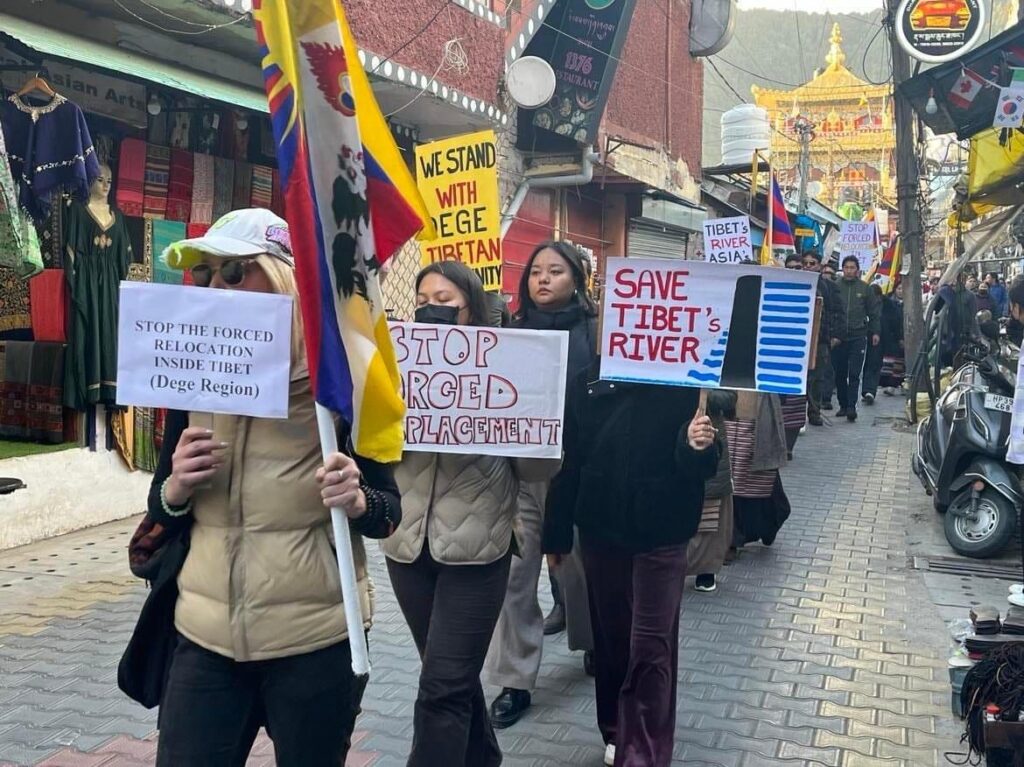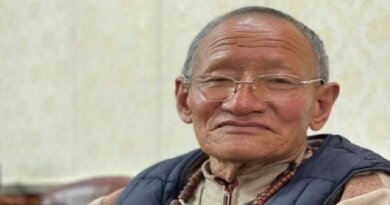Drichu Dam Protest: Tibetan Protests Unmask China’s Dual Narrative on Human Rights

DHARAMSALA, 23 Feb: Tibetans in Dharamsala, the exile headquarters of the Tibetan people, rallied in solidarity with Tibetans in Derge County in the Traditional Tibetan province of Kham, who have been protesting peacefully against China’s construction of a dam along the Drichu River. The protest, coordinated by prominent Tibetan NGOs based here, aims to amplify the voices of Tibetans in Derge who face forced displacement from their ancestral land and other forms of repression from Chinese authorities.
The protest, jointly organised by the Tibetan Women’s Association, the National Democratic Party of Tibet, Students for a Free Tibet- India, and the Regional Tibetan Youth Congress, saw Tibetans carrying slogans such as “Stop forced relocation” and “Save Tibet’s River,” among others, at the protest rally held at the main square in Mcleod Ganj on Thursday.
“We stand in solidarity with the Tibetan community in Dege County in Tibet as they peacefully protest against the construction of a hydropower dam on the Drichu River. This project threatens the displacement of residents from two villages and six monasteries, jeopardizing their homes, livelihoods, and cultural heritage,” read a joint statement issued by the Tibetan NGOs that condemned China’s hydropower project along the Drichu River while expressing their solidarity with the Tibetans in Derge county who have been peacefully protesting against the project.
“The resilience and courage displayed by the Tibetan protesters in the face of adversity are commendable. Their determination to protect their land and way of life deserves our unwavering support and solidarity,” it added.
The joint press release declared China’s “continued disregard for the rights and well-being of Tibetans in the face of such development projects unacceptable,” demanding urgent attention from the global community.
Emphasising Tibet’s substantial global significance as the “Third Pole,” due to its glaciers and rivers that “serve as the source of major rivers that sustain over 1.5 billion people across Asia,” the release adds that “The ecological stability of Tibet is therefore essential for the well-being of not only Tibetans but also countless others who depend on these vital waterways.”
The NGOs warned that the construction of the Drichu River dam not only jeopardises local Tibetan communities but also threatens the fragile Tibetan plateau ecosystem and downstream livelihoods. “Any disruption to Tibet’s rivers and a diversion of the rivers could have far-reaching consequences for the environment, biodiversity, and livelihoods of millions of people downstream.”
The statement concluded by urging the international community to take notice and advocate for the protection of the rights and dignity of the Tibetan people and to call for immediate action to halt the dam project.
“It is imperative that we amplify the voices of Tibetans and stand in solidarity with them in their struggle for dignity, self-determination, and justice.”

The Chinese authorities recently announced that people living around the Drichu River in China’s demarcated Derge County in Kardze prefecture and Jomda in eastern Chamdo prefecture in the so-called Tibetan Autonomous Region must move from their area to make way for a planned hydropower dam project. The solidarity protest was ignited by chilling video clips that have surfaced online since February 14, revealing the harsh realities faced by Tibetans in Derge and depicting Tibetan pleas to the Chinese authorities, decrying their forced relocation due to the hydro project.
The situation in Derge has since escalated, with Tibetans from every walk of life joining the protest, urging the Chinese authorities to scrap the hydro project as more reports pour in. According to the latest updates and videos from Tibet, Chinese police have launched brutal crackdowns, resulting in the arrest and assault of hundreds of Tibetans who have been peacefully protesting in Derge County.
The latest development, China’s heavy-handed crackdown, paints a completely contrasting picture of its remarks before the International Court of Justice in The Hague, Netherlands, on Thursday, during the hearing of the Israeli occupation of the Palestinians. There, China’s Foreign Ministry’s legal adviser, Ma Xinmin, said that “Justice has been long delayed, but it must not be denied,” while invoking international law and declaring the Palestinians’ “pursuit of the right to self-determination” legitimate, even with the “use of force to resist foreign oppression.” However, in practice, China continues to oppress and suppress the Tibetans, violating and denying them the same rights.
For the uninitiated, China’s ill-advised developmental projects, thirst for mineral resources, and desire to exploit the rich deposits under the Tibetan plateau have led to numerous protests by the Tibetans, who consider the hills and lakes sacred as they believe them to be the abode of gods who have protected the community and the land from time immemorial.
However, Chinese authorities have reacted to these protests by beating, arresting, and also firing live ammunition at Tibetan protesters, resulting in the spread of environmental pollution and anguish for local Tibetans whose ancestors lived here for thousands of years.
Activists and rights groups alike have long criticised such malpractice as it threatens the Yellow, Yangtze, Ganges, and other rivers that hundreds of millions of people depend on.
In line with these concerns, scientists and experts in China have warned that China’s Three Gorges Dam, built on the Yangtze River, which is the world’s biggest hydropower project, may be causing giant landslides in China after it cost $59 billion and 12 years to build.






